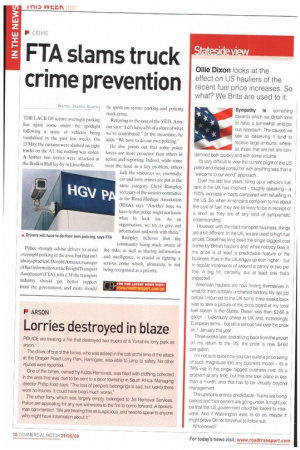011ie Dixon looks at the effect on US hauliers of
Page 10

If you've noticed an error in this article please click here to report it so we can fix it.
the recent fuel price increases. So what? We Brits are used to it.
Sympathy is something towards which we British tend to have a somewhat ambiguous approach. The causes we see as deserving it tend to receive large amounts, whereas those that are not are condemned both quickly and with some volume.
It's very difficult to view the current plight of the US petrol and diesel consumer with anything less than a "welcome to our world" approach.
Over the last few years, filling up a vehicle's fuel tank in the UK has involved roughly speaking a 100% increase in costs compared with refuelling in the US. So, when Americans complain to me about the cost of fuel, they are as likely to be in receipt of a snort as they are of any kind of sympathetic understanding.
However, with the road transport business, things are a bit different. In the UK, we are used to high fuel prices. Diesel has long been the single biggest cost borne by British hauliers and, while nobody likes it, the price is at least a predictable feature of the business. Fuel in the UK edges up ever higher but in regular increments of around a penny or two per litre. A big hit, certainly, but at least one that's expected.
American haulers are now finding themselves in what for them is totally uncharted territory. My last job before I returned to the UK some three weeks back was to take a picture of the price board at my local fuel station in the States. Diesel was then $3.66 a gallon ludicrously cheap in UK and, increasingly, European terms but still a serious hike over the price on 1 January this year.
Three weeks later, and driving back from the airport on my return to the US, the price is now $4.64 per gallon.
I'm not sure quite how you can build a price swing of such magnitude into any business model it's a 78% rise in the single biggest business cost. It's a problem at any time, but this one took place in less than a month, and that has to be virtually beyond management.
The upshot is entirely predictable. Trucks are being parked and their owners are going under. It might just be that the US government could be forced to intervene. And if Washington were to do so, maybe it might prove OK for Whitehall to follow suit.
Who knows?




































































































































































